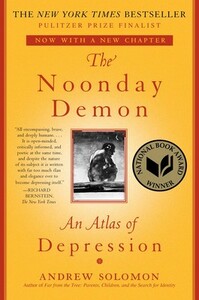Take a photo of a barcode or cover
challenging
dark
informative
reflective
slow-paced
"The Noonday Demon" is a book that people who suffer from depression should consider reading. The author, Andrew Solomon, while not a psychologist/psychiatrist/medical professional has suffered from major depression for most of his life and he talks about his journey through the ups and downs. He includes interviews with other people who all fall on different places on the mental health spectrum. One of the things his book deals with that many others in the field don't is the link between depression and poverty, which I felt was important to include. The other good point about this book is that the author discusses the differences in how men and women suffer from depression, which was very illuminating for me as most books don't go into a detailed description of gender and depression.
Some readers who have a more acute/situational/mild depression will read the author's story and reflect that they do have a lot to be grateful for, because depression in its most extreme form can cause many things a person wouldn't expect, such as loss of a sense of humour or losing the ability to become happy at anything. The one drawback to this book for me was that it was a doorstopper and felt at times like a slog to get through, but there were useful nuggets sprinkled between each section.
Other sections include the history of depression and how mental illness was treated historically, depression from an evolutionary standpoint, the pharmaceutical aspects of drugs that are used to treat depression, and other treatments such as electroshock therapy, surgeries, and EMDR among other techniques. For those who prefer more scientific chapters, they will also benefit from this book.
It's a different kind of reading experience than the prescriptive "how to" books of which people who suffer from depression have read in the thousands. Rather than telling the reader "This is how to get over depression", it's unique to hear from the perspective of someone who has firsthand knowledge of depression rather than a mental health professional who, although they certainly do offer useful strategies and advice in their own texts and are basing this on years of experience with depressed people in the field, may be at a loss to convincingly take the reader's hand, squeeze it gently and say "I know your pain because I deal with it every single day, too."
While you won't get any coping mechanisms or strategies or points for moving forward, Andrew Solomon's books may help you understand more about your depression and if nothing else, give you the important perspective to show that you are definitely not alone with this disease, you should absolutely take it seriously and take steps to help yourself, and that if you're taking steps to help yourself, there IS light at the end of the tunnel.
Some readers who have a more acute/situational/mild depression will read the author's story and reflect that they do have a lot to be grateful for, because depression in its most extreme form can cause many things a person wouldn't expect, such as loss of a sense of humour or losing the ability to become happy at anything. The one drawback to this book for me was that it was a doorstopper and felt at times like a slog to get through, but there were useful nuggets sprinkled between each section.
Other sections include the history of depression and how mental illness was treated historically, depression from an evolutionary standpoint, the pharmaceutical aspects of drugs that are used to treat depression, and other treatments such as electroshock therapy, surgeries, and EMDR among other techniques. For those who prefer more scientific chapters, they will also benefit from this book.
It's a different kind of reading experience than the prescriptive "how to" books of which people who suffer from depression have read in the thousands. Rather than telling the reader "This is how to get over depression", it's unique to hear from the perspective of someone who has firsthand knowledge of depression rather than a mental health professional who, although they certainly do offer useful strategies and advice in their own texts and are basing this on years of experience with depressed people in the field, may be at a loss to convincingly take the reader's hand, squeeze it gently and say "I know your pain because I deal with it every single day, too."
While you won't get any coping mechanisms or strategies or points for moving forward, Andrew Solomon's books may help you understand more about your depression and if nothing else, give you the important perspective to show that you are definitely not alone with this disease, you should absolutely take it seriously and take steps to help yourself, and that if you're taking steps to help yourself, there IS light at the end of the tunnel.
„Depresia este punctul nevralgic al iubirii. Pentru a fi făpturi care iubesc, trebuie să fim făpturi care pot cădea pradă disperării din cauza unei pierderi, iar depresia e mecanismul acelei disperări. Când se instalează, degradează eul şi, în cele din urmă, eclipsează capacitatea de a da ori de a primi afecţiune. E lăuntrica noastră singurătate manifestă. Ea distruge nu numai legătura cu ceilalţi, ci şi capacitatea de a fi împăcat când eşti doar cu tine însuţi. Iubirea, chiar dacă nu are rolul de a ne păzi de depresie, este ceea ce protejează mintea şi o apără de sine. Medicamentele şi psihoterapia pot să regenereze această protecţie, făcând să fie mai uşor să iubeşti şi să fii iubit, şi de aceea dau roade. Când sunt în dispoziţie bună, unii se iubesc pe ei înşişi, unii îi iubesc pe alţii, unii iubesc munca, iar unii îl iubesc pe Dumnezeu: oricare dintre aceste obiecte ale pasiunii poate furniza acel sens vital al scopului, care este opusul depresiei. Iubirea uită din când în când de noi, iar noi uităm de iubire. În depresie, devine de la sine înţeles lipsa de scop a oricărei iniţiative şi a fiecărei emoţii, lipsa de sens a vieţii înseşi. Singurul sentiment ce rămâne în această stare lipsită de iubire este lipsa de importanţă.”
emotional
informative
medium-paced
challenging
hopeful
informative
inspiring
reflective
slow-paced
I decided to give this four stars because I am sure it is a great, thoughtful, helpful and well researched book. I'm sure there's humor in there, tons of interesting, heartwarming and, well yes, depressing stories, and I'm sure it can help many people understand what depression is - if any book can do that.
I say I'm sure this is so because I suffered so much reading the Spanish translation of this that I just don't know. There were entire paragraphs I didn't quite understand, entire chapters that bored me to death, which was extremely weird and frustrating, because here I was, reading an obviously great book about a subject that interests me, and I consistently fall asleep? I seriously considered mono at one point. But it wasn't. It was just a bad translation. And not even the worst I've ever read. But bad enough.
I've learned my lesson though. No more translations into Spanish. Of anything. Ever.
I say I'm sure this is so because I suffered so much reading the Spanish translation of this that I just don't know. There were entire paragraphs I didn't quite understand, entire chapters that bored me to death, which was extremely weird and frustrating, because here I was, reading an obviously great book about a subject that interests me, and I consistently fall asleep? I seriously considered mono at one point. But it wasn't. It was just a bad translation. And not even the worst I've ever read. But bad enough.
I've learned my lesson though. No more translations into Spanish. Of anything. Ever.
All you need to know about depression is probably in this book
Thoroughly researched book on the subject of depression. The audio book is narrated by the author and includes many personal stories and struggles with depression. I'd recommend this book for just about anybody - those suffering from depression, family members, the general public, etc... Those ignorant about the disease could benefit from an understanding of what its sufferers have had to deal with.
emotional
informative
inspiring
reflective
sad
medium-paced
I really loved this book and would've given it five stars but for two issues:
1. It was really only about severe depression, not depression in general. While those stories are obviously important and deserve to be told, the majority of people who suffer from depression do not have major breakdowns, lose their jobs and friends, get hospitalized, or undergo ECT or psychosurgery. It would've been nice if the book gave more attention to those with milder forms of depression.
2. The fact that Solomon decided to give space in his book to wacky alternative treatments really, really disappointed me. He was clearly hoping to give hope to many people. Giving them hope in the form of unverified quackery seems irresponsible to me. The huge passage about some creepy African ritual involving ram's blood also seemed unnecessary and a bit voyeuristic.
That said, I'm really glad that the book used real names and discussed the connection between depression and poverty. But the author does come from a place of incredible privilege, and you have to take that into account when reading this.
1. It was really only about severe depression, not depression in general. While those stories are obviously important and deserve to be told, the majority of people who suffer from depression do not have major breakdowns, lose their jobs and friends, get hospitalized, or undergo ECT or psychosurgery. It would've been nice if the book gave more attention to those with milder forms of depression.
2. The fact that Solomon decided to give space in his book to wacky alternative treatments really, really disappointed me. He was clearly hoping to give hope to many people. Giving them hope in the form of unverified quackery seems irresponsible to me. The huge passage about some creepy African ritual involving ram's blood also seemed unnecessary and a bit voyeuristic.
That said, I'm really glad that the book used real names and discussed the connection between depression and poverty. But the author does come from a place of incredible privilege, and you have to take that into account when reading this.





